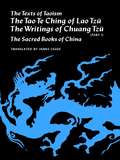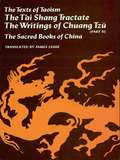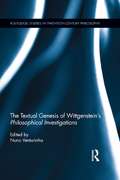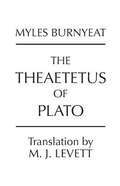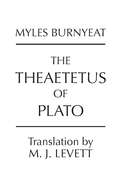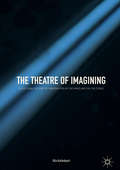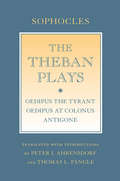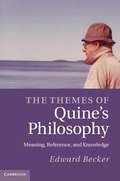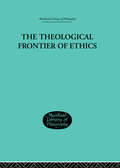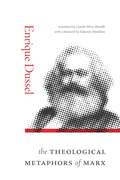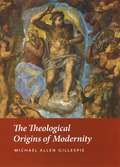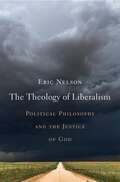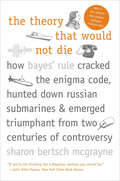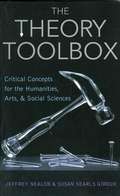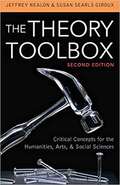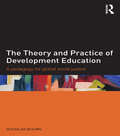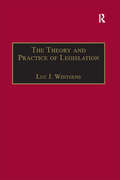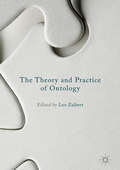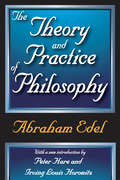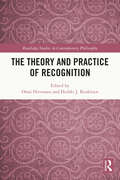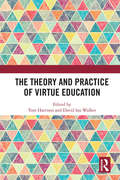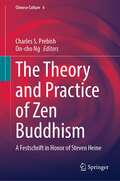- Table View
- List View
The Texts of Taoism: Part I
by James LeggeThese two volumes contain the complete James Legge translation of the sacred writings of the great mystical religion that for millennia has counterbalanced the official Confucianism of the Chinese state. Together with the Confucian canon, these writings have been avidly studied by generations of Chinese scholars and literary men and their place in the formation of Chinese civilization is central.First published as volume xxxix and xl of Max Müller's Sacred Books of the East series, these volumes contain the complete texts of the Tao Te Ching attributed to Lao Tzü; the writings of Chuang Tzü; and several shorter works; the T'ai Shang or Tractate of Actions and Their Retributions, the Ch'ing Chang Ching or Classic of Purity, the Yin Fu Ching of Classic of the Harmony of the Seen and Unseen, the Yü Shu Ching or Classic of the Pivot of jade, and the Hsia Yung Ching or Classic of the Directory for a Day. Many of these lesser documents are to be found in translation only in this collection.Professor Legge, who held the chair in Chinese language and literature at Oxford for 20 years, introduces the collection with a discussion of differences among Confucianism, Taoism, and Buddhism, the authorship of the Tao Te Ching, the real meaning of Tao in Chinese thought, and other backgrounds.Orientalists and students of religion have long recognized this collection as indispensable. But laymen will find that the Tao Te Ching is not only profound but provocative and stimulating and that the parables and tales in the work of Chuang Tzü are delightful reading.
The Texts of Taoism: Part II
by James LeggeThese two volumes contain the complete James Legge translation of the sacred writings of the great mystical religion that for millennia has counterbalanced the official Confucianism of the Chinese state. Together with the Confucian canon, these writings have been avidly studied by generations of Chinese scholars and literary men and their place in the formation of Chinese civilization is central.First published as volume xxxix and xl of Max Müller's Sacred Books of the East series, these volumes contain the complete texts of the Tao Te Ching attributed to Lao Tzü; the writings of Chuang Tzü; and several shorter works; the T'ai Shang or Tractate of Actions and Their Retributions, the Ch'ing Chang Ching or Classic of Purity, the Yin Fu Ching of Classic of the Harmony of the Seen and Unseen, the Yü Shu Ching or Classic of the Pivot of jade, and the Hsia Yung Ching or Classic of the Directory for a Day. Many of these lesser documents are to be found in translation only in this collection.Professor Legge, who held the chair in Chinese language and literature at Oxford for 20 years, introduces the collection with a discussion of differences among Confucianism, Taoism, and Buddhism, the authorship of the Tao Te Ching, the real meaning of Tao in Chinese thought, and other backgrounds.Orientalists and students of religion have long recognized this collection as indispensable. But laymen will find that the Tao Te Ching is not only profound but provocative and stimulating and that the parables and tales in the work of Chuang Tzü are delightful reading.
The Textual Genesis of Wittgenstein's Philosophical Investigations (Routledge Studies in Twentieth-Century Philosophy)
by Nuno VenturinhaSixty years after its first edition, there is an increasing consensus among scholars that the work posthumously published as Philosophical Investigations represents something that is far from a complete picture of Wittgenstein’s second book project. G.H. von Wright’s seminal research on the Nachlass was an important contribution in this direction, showing that the Wittgenstein papers can reveal much more than the source of specific remarks. This book specifically explores Wittgenstein’s Philosophical Investigations from the different angles of its originary conceptions, including the mathematical texts, shedding new light on fundamental issues in twentieth century and contemporary philosophy. Leading authorities in the field focus on newly published or hitherto unpublished sources for the interpretation of Wittgenstein’s later work and a Wittgenstein typescript, translated for the first time into English, is included as an appendix.
The Theaetetus Of Plato
by Plato Myles Burnyeat M. J. LevettM. J. Levett's elegant translation of Plato's Theaetetus , first published in 1928, is here revised by Myles Burnyeat to reflect contemporary standards of accuracy while retaining the style, imagery, and idiomatic speech for which the Levett translation is unparalleled. Bernard Williams concise introduction, aimed at undergraduate students, illuminates the powerful argument of this complex dialogue, and illustrates its connections to contemporary metaphysical and epistemological concerns.
The Theaetetus of Plato
by Plato Myles Burnyeat M. J. LevettM. J. Levett's elegant translation of Plato's Theaetetus, first published in 1928, is here revised by Myles Burnyeat to reflect contemporary standards of accuracy while retaining the style, imagery, and idiomatic speech for which the Levett translation is unparalleled. Bernard William’s concise introduction, aimed at undergraduate students, illuminates the powerful argument of this complex dialogue, and illustrates its connections to contemporary metaphysical and epistemological concerns.
The Theatre of Imagining: A Cultural History of Imagination in the Mind and on the Stage
by Ulla KallenbachThis book is the first comprehensive analysis of the fascinating and strikingly diverse history of imagination in the context of theatre and drama. Key questions that the book explores are: How do spectators engage with the drama in performance, and how does the historical context influence the dramaturgy of imagination? In addition to offering a study of the cultural history and theory of imagination in a European context including its philosophical, physiological, cultural and political implications, the book examines the cultural enactment of imagination in the drama text and offers practical strategies for analyzing the aesthetic practice of imagination in drama texts. It covers the early modern to the late modernist period and includes three in-depth case studies: William Shakespeare’s Macbeth (c.1606); Henrik Ibsen’s A Doll’s House (1879); and Eugène Ionesco’s The Killer (1957).
The Theban Plays: "Oedipus the Tyrant"; "Oedipus at Colonus"; "Antigone"
by Sophocles Peter J. Ahrensdorf Thomas L. PangleThe timeless Theban tragedies of Sophocles--Oedipus the Tyrant, Oedipus at Colonus, and Antigone--have fascinated and moved audiences and readers across the ages with their haunting plots and their unforgettable heroes and heroines. Now, following the best texts faithfully, and translating the key moral, religious, and political terminology of the plays accurately and consistently, Peter J. Ahrensdorf and Thomas L. Pangle allow contemporary readers to study the most literally exact reproductions of precisely what Sophocles wrote, rendered in readily comprehensible English.These translations enable readers to engage the Theban plays of Sophocles in their full, authentic complexity, and to study with precision the plays' profound and enduring human questions. In the preface, notes to the plays, and introductions, Ahrensdorf and Pangle supply critical historical, mythic, and linguistic background information, and highlight the moral, religious, political, philosophic, and psychological questions at the heart of each of the plays. Even readers unfamiliar with Greek drama will find what they need to experience, reflect on, and enjoy these towering works of classical literature.
The Themes of Quine'S Philosophy
by Edward F. BeckerWillard Van Orman Quine's work revolutionized the fields of epistemology, semantics and ontology. At the heart of his philosophy are several interconnected doctrines: his rejection of conventionalism and of the linguistic doctrine of logical and mathematical truth, his rejection of the analytic/synthetic distinction, his thesis of the indeterminacy of translation and his thesis of the inscrutability of reference. In this book Edward Becker sets out to interpret and explain these doctrines. He offers detailed analyses of the relevant texts, discusses Quine's views on meaning, reference and knowledge, and shows how Quine's views developed over the years. He also proposes a new version of the linguistic doctrine of logical truth, and a new way of rehabilitating analyticity. His rich exploration of Quine's thought will interest all those seeking to understand and evaluate the work of one of the most important philosophers of the second half of the twentieth century.
The Themes of Quine's Philosophy
by Edward BeckerWillard Van Orman Quine's work revolutionized the fields of epistemology, semantics and ontology. At the heart of his philosophy are several interconnected doctrines: his rejection of conventionalism and of the linguistic doctrine of logical and mathematical truth, his rejection of the analytic/synthetic distinction, his thesis of the indeterminacy of translation and his thesis of the inscrutability of reference. In this book Edward Becker sets out to interpret and explain these doctrines. He offers detailed analyses of the relevant texts, discusses Quine's views on meaning, reference and knowledge, and shows how Quine's views developed over the years. He also proposes a new version of the linguistic doctrine of logical truth, and a new way of rehabilitating analyticity. His rich exploration of Quine's thought will interest all those seeking to understand and evaluate the work of one of the most important philosophers of the second half of the twentieth century.
The Theological Frontier of Ethics
by MacLagan, W GFirst published in 2002. Routledge is an imprint of Taylor & Francis, an informa company.
The Theological Metaphors of Marx
by Enrique DusselIn The Theological Metaphors of Marx, Enrique Dussel provides a groundbreaking combination of Marxology, theology, and ethical theory. Dussel shows that Marx unveils the theology of capitalism in his critique of commodity fetishization. Capitalism constitutes an idolatry of the commodity that undergirds the capitalist expropriation of labor. Dussel examines Marx’s early writings on religion and fetishism and proceeds through what Dussel refers to as the four major drafts of Capital, ultimately situating Marx’s philosophical, economic, ethical, and historical insights in relation to the theological problems of his time. Dussel notes a shift in Marx’s underlying theological schema from a political critique of the state to an economic critique of the commodity fetish as the Devil, or anti-God, of modernity. Marx’s thought, impact, and influence cannot be fully understood without Dussel’s historic reinterpretation of the theological origins and implications of Marx’s critiques of political economy and politics.
The Theological Origins of Modernity
by Michael Allen GillespieExposing the religious roots of our ostensibly godless age, Michael Allen Gillespie reveals in this landmark study that modernity is much less secular than conventional wisdom suggests. Taking as his starting point the collapse of the medieval world, Gillespie argues that from the very beginning moderns sought not to eliminate religion but to support a new view of religion and its place in human life. He goes on to explore the ideas of such figures as William of Ockham, Petrarch, Erasmus, Luther, Descartes, and Hobbes, showing that modernity is best understood as a series of attempts to formulate a new and coherent metaphysics or theology. "Bringing the history of political thought up to date and situating it against the backdrop of contemporary events, Gillespie's analyses provide us a way to begin to have conversations with the Islamic world about what is perhaps the central question within each of the three monotheistic religions: if God is omnipotent, then what is the place of human freedom?"--Joshua Mitchell, Georgetown University
The Theology of Liberalism: Political Philosophy and the Justice of God
by Eric NelsonModern liberal political philosophy is closely associated with post-1945 secularism. But Eric Nelson contends that the liberal tradition founded by John Rawls is an unwitting outgrowth of ancient theological debates about justice and evil. When we understand this, we can better untangle the knotted strands of liberal political thought.
The Theory Of Celestial Influence: Man, The Universe, and Cosmic Mystery
by Rodney CollinOriginally published in 1954, The Theory of Celestial Influence is an exploration of the universe and man's place in it. Drawing extensively on the teachings of Russian mathematician and esotericist P. D. Ouspensky and Greek-Armenian Esoteric doctrine teacher George Gurdjieff, author Rodney Collins examines 20th century scientific discoveries and attempts to unite astronomy, physics, chemistry, human physiology and world history with his own version of planetary influences. He concludes that the driving force behind everything is neither procreation nor survival, but expansion of awareness. Collin sets out to reconcile the considerable contradictions of the rational and imaginative minds and of the ways we see the external world versus our inner selves.
The Theory That Would Not Die: How Bayes' Rule Cracked the Enigma Code, Hunted Down Russian Submarines, & Emerged Triumphant from Two Centuries of C
by Sharon Bertsch McGrayne"This account of how a once reviled theory, Baye&’s rule, came to underpin modern life is both approachable and engrossing" (Sunday Times). A New York Times Book Review Editors&’ Choice Bayes' rule appears to be a straightforward, one-line theorem: by updating our initial beliefs with objective new information, we get a new and improved belief. To its adherents, it is an elegant statement about learning from experience. To its opponents, it is subjectivity run amok. In the first-ever account of Bayes' rule for general readers, Sharon Bertsch McGrayne explores this controversial theorem and the generations-long human drama surrounding it. McGrayne traces the rule&’s discovery by an 18th century amateur mathematician through its development by French scientist Pierre Simon Laplace. She reveals why respected statisticians rendered it professionally taboo for 150 years—while practitioners relied on it to solve crises involving great uncertainty and scanty information, such as Alan Turing's work breaking Germany's Enigma code during World War II. McGrayne also explains how the advent of computer technology in the 1980s proved to be a game-changer. Today, Bayes' rule is used everywhere from DNA de-coding to Homeland Security. Drawing on primary source material and interviews with statisticians and other scientists, The Theory That Would Not Die is the riveting account of how a seemingly simple theorem ignited one of the greatest controversies of all time.
The Theory Toolbox: Critical Concepts For The Humanities, Arts, & Social Sciences (Culture and Politics Ser.)
by Jeffrey Nealon Susan GirouxThis text involves students in understanding and using the 'tools' of critical social and literary theory from the first day of class. It is an ideal first introduction before students encounter more difficult readings from critical and postmodern perspectives. Nealon and Giroux describe key concepts and illuminate each with an engaging inquiry that asks students to consider deeper and deeper questions. Written in students' own idiom, and drawing its examples from the social world, literature, popular culture, and advertising, The Theory Toolbox offers students the language and opportunity to theorize rather than positioning them to respond to theory as a reified history of various schools of thought. Clear and engaging, it avoids facile description, inviting students to struggle with ideas and the world by virtue of the book's relentless challenge to common assumptions and its appeal to common sense.
The Theory Toolbox: Critical Concepts For The Humanities, Arts, And Social Sciences
by Susan Searls Giroux Jeffrey NealonThis text involves students in understanding and using the "tools" of critical social and literary theory from the first day of class. It is an ideal first introduction before students encounter more difficult readings from critical and postmodern perspectives. Nealon and Searls Giroux describe key concepts and illuminate each with an engaging inquiry that asks students to consider deeper and deeper questions. Written in students' own idiom, and drawing its examples from the social world, literature, popular culture, and advertising, The Theory Toolbox offers students the language and opportunity to theorize rather than positioning them to respond to theory as a reified history of various schools of thought. Clear and engaging, it avoids facile description, inviting students to struggle with ideas and the world by virtue of the book's relentless challenge to common assumptions and its appeal to common sense. Updated throughout, the second edition of The Theory Toolbox includes a discussion of new media, as well as two new chapters on life and nature.
The Theory and Practice of Development Education: A pedagogy for global social justice
by Douglas BournDevelopment education is much more than learning about development; it is a pedagogy for the globalised societies of the twenty-first century that incorporates discourses from critical pedagogy and postcolonialism, and a mechanism for ensuring that differing perspectives are reflected within education, particularly those from developing countries. Learning about development and global issues is now part of the school curriculum in a number of countries, and terms such as global citizenship, sustainable development and cultural understanding are commonplace in many educational contexts. Development education has been recognised as one of the educational discourses that has influenced the acceptance of these terms, for both policy-makers and practitioners. This ground-breaking volume addresses the history, theoretical influences, practices and impact of development education in Europe, North America, Australia and Japan. Chapters include how development education evolved, the influence of theorists such as Paulo Freire, the practices of aid and development agencies, and the impact of governments seeking evidence of public understanding of and engagement with development. The Theory and Practice of Development Education provides essential reading for anyone engaged in re-thinking and reflecting upon the educational needs of a globalised society, and seeking approaches towards learning that place social justice at the heart of that practice. It will be of particular interest to academics and postgraduate students in the fields of development education, international education and globalisation.
The Theory and Practice of Legislation: Essays in Legisprudence (Applied Legal Philosophy)
by Luc J. WintgensThis work provides a rational framework for legislation. The unifying premise behind the essays is that, although legislation and regulation are the result of a political process, legislation and regulation can be the object of theoretical study. The volume focuses on problems that are common to most European legal systems and the approach involves applying to legislative problems the tools of legal theory - hence 'legisprudence'. Whereas traditional legal theory deals predominantly with the application of law by the judge, legisprudence enlarges the field of study so as to include the creation of law by the legislator. The original essays published in this collection expose and develop a range of new insights into the relationship between legislative problems and legal theory in a way which will engage and interest legal scholars throughout the world.
The Theory and Practice of Ontology
by Leo ZaibertThis book provides close examination of ontology and the work of Professor Barry Smith, one of the most prolific philosophers of the modern day. In this book numerous scholars who have collaborated with Smith explore the various disciplines in which the impact of his work has been felt over the breadth of his career, including biology, computer science and informatics, cognitive science, economics, genetics, geography, law, neurology, and philosophy itself. While offering in-depth perspectives on ontology, the book also expands upon the breadth of Smith's influence. With insights from renowned and influential scholars from many different countries, this book is an informative and enlightening celebration of all Smith has contributed to numerous academic schools of thought.
The Theory and Practice of Philosophy
by Abraham EdelThere is an historical element throughout philosophy. As Edel notes, this is always in the context of problems, so emphasis will fall on the major objective of reflective analysis of ideas. The major objective of Edel's analysis in The Theory and Practice of Philosophy is the fundamental interrelatedness of problems of method, metaphysics, and value. Each part is an integral whole, complete in itself.That philosophy has this central role in human practice indicates that it should be neither discarded nor deified. This is the explicit premise of the book. Students are likely to be faced increasingly with a demand for clarification on the fundamental issues of life and value. The expectation that philosophy will provide ready-made answers to these kinds of questions is as naive as the demand for any panacea, but this task cannot be turned over to any other department of human knowledge or any other branch of social activity.By placing emphasis on the importance of theory in matters of practice, the need for clear and systematic understanding of the world and man within it, and on the constant role of reflection in the management of human affairs, Edel seeks to shed light on the larger questions of philosophy by examining them in a systematic way. The result is a great text and tool for students and teachers that deals directly with the fundamental issues of our civilization.
The Theory and Practice of Recognition (Routledge Studies in Contemporary Philosophy)
by Heikki J. Koskinen Onni HirvonenThis volume presents new essays on the theory and practice of recognition. In order to retain its overall plausibility as a critical social theory, contemporary recognition theory needs to be able to successfully combine theory with real-life perspectives, in both contemporary and historical contexts. Contemporary recognition theory has developed into an established and active multidisciplinary research programme. The chapters in this volume have two main purposes. First, they engage in theoretical development of the contemporary theories of recognition. They explore the conceptual histories and the environments of recognition, as well as the connection between recognition and authenticity, emancipation, and social ontology. Second, they connect the theoretical insights of contemporary recognition with analyses of contemporary and historical social practices. These contributions explore themes such as populism and polarization, models of harmful invisibilization and social ignorance, the problem of evil and suffering, and social justice phenomena such as the #MeToo movement. The Theory and Practice of Recognition will be of interest to scholars and advanced students working in social and political philosophy, social ontology, political theory, and sociology.
The Theory and Practice of Recognition (Routledge Studies in Contemporary Philosophy)
by Heikki J. Koskinen Onni HirvonenThis volume presents new essays on the theory and practice of recognition. In order to retain its overall plausibility as a critical social theory, contemporary recognition theory needs to be able to successfully combine theory with real-life perspectives, in both contemporary and historical contexts.Contemporary recognition theory has developed into an established and active multidisciplinary research programme. The chapters in this volume have two main purposes. First, they engage in theoretical development of the contemporary theories of recognition. They explore the conceptual histories and the environments of recognition, as well as the connection between recognition and authenticity, emancipation, and social ontology. Second, they connect the theoretical insights of contemporary recognition with analyses of contemporary and historical social practices. These contributions explore themes such as populism and polarization, models of harmful invisibilization and social ignorance, the problem of evil and suffering, and social justice phenomena such as the #MeToo movement.The Theory and Practice of Recognition will be of interest to scholars and advanced students working in social and political philosophy, social ontology, political theory, and sociology.
The Theory and Practice of Virtue Education (Routledge Research in Character and Virtue Education)
by Tom Harrison David Ian WalkerThe Theory and Practice of Virtue Education offers the reader a comprehensive and authoritative account of both the theoretical and practical complexities of cultivating virtue in education and beyond. The book moves beyond the usual philosophical literature that merely discusses virtue in the abstract, and offers scholarly, research-informed suggestions for practice.Drawn from a highly successful international conference organised by the Jubilee Centre for Character and Virtues, the chapters in this volume offer a unique insight into the varieties of approaches that leading scholars have identified for putting the learning and nurturing of virtues into practice. Featured are chapters from internationally acclaimed scholars primarily in the fields of philosophy, psychology and education, which are categorised under three headings: philosophical and theoretical foundations for cultivating virtues; developing virtues in practice; and nurturing specific virtues. Beginning with chapters that examine differing theoretical complexities of virtue education, the book then moves on to explore different approaches to nurturing virtue in the classroom and beyond. This practical approach is further evidenced in the final section, where individual virtues are discussed.The Theory and Practice of Virtue Education highlights the theoretical complexity of putting virtue education into practice and, as a result, is of real use to researchers, academics and postgraduates in the fields of education, philosophy, psychology, sociology and theology. It should also be essential reading for educators in character and virtue.
The Theory and Practice of Zen Buddhism: A Festschrift in Honor of Steven Heine (Chinese Culture #6)
by Charles S. Prebish On-Cho NgThis book brings together an impressive group of scholars to critically engage with a wide-ranging and broad perspective on the historical and contemporary phenomenon of Zen. The structure of the work is organized to reflect the root and branches of Zen, with the root referring to important episodes in Chan/Zen history within the Asian context, and the branches referring to more recent development in the West. In collating what has transpired in the last several decades of Chan/Zen scholarship, the collection recognizes and honors the scholarly accomplishments and influences of Steven Heine, arguably the most important Zen scholar in the past three decades. As it looks back at the intellectual horizons that this towering figure in Zen/Chan studies has pioneered and developed, it seeks to build on the grounds that were broken and subsequently established by Heine, thereby engendering new works within this enormously important religio-cultural scholarly tradition. This curated Festschrift is a tribute, both retrospective and prospective, acknowledging the foundational work that Heine has forged, and generates research that is both complementary and highly original. This academic ritual of assembling a liber amicorum is based on the presumption that sterling scholarship should be honored by conscientious scholarship. In the festive spirit of a Festschrift, this anthology consists of the resounding voices of Heine and his colleagues. It is an indispensable collection for students and scholars interested in Japanese religion and Chinese culture, and for those researching Zen Buddhist history and philosophy.
